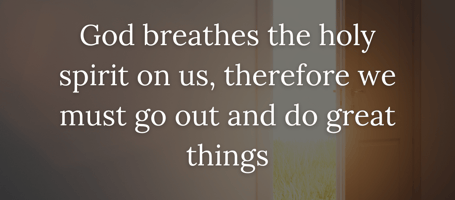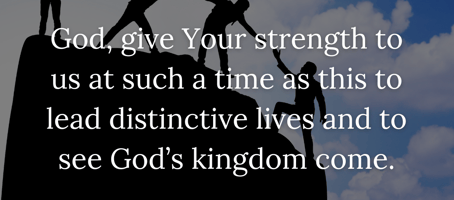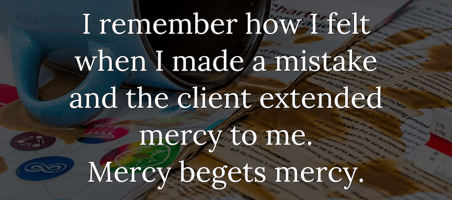This blog is based on a sermon by Pastor Teresa Howell-Smith on April 7, 2024 Have you ever reached...
Though the Wrong is Oft So Strong, God is the Ruler Yet

This blog is based on a guest sermon by Pastor John Helt on April 21, 2024
All creation waits with eager longing in hope that the creation itself will be set free from its bondage to decay. You may recognize the familiar song that is behind these revised words:
Our God has made this world, so let us ne’er forget, that though the wrong seems oft so strong, God is the ruler yet. God trusts us with this world to keep it clean and fair, all earth and trees, the skies and seas. God's creatures everywhere. Though the wrong is oft so strong, God is the ruler yet.
It’s pretty obvious that the wrong is strong, isn’t it? A candidate for president tells fossil fuel executives at his estate, “I hate wind!” (And I don't think it was meant ironically). As Reinhold Niebuhr put it: “The original sin is the one empirically verifiable Christian doctrine.”
Much of our world does seem broken these days. The planet is warming. Instead of saying “climate change,” more and more people are using words like “climate catastrophe” or “apocalypse.” Climate scientist Katharine Hayhoe says we shouldn't talk about global warming as much as we should talk about “global weirding.” The temperature and weather of last year would warrant that.
We’re at a tipping point. Evidence of the fall overshadows our memory of Eden. In Paul's words, creation is in bondage to decay and because of it, some of us despair. We have fouled the nest of what Pope Francis calls our common home and we must clean house. We need to join together in setting free God's creation from its bondage to decay. We need to act as though we truly believe that God is the ruler yet. The challenges are enormous, but we need not fear, and it's not all bad news. I am hopeful that we will emerge from this present bondage freer and with a healthier appreciation for our precious and fragile planet – our common home.
A recent New York Times essay by Liz Jensen compared this climate crisis to the loss of her own child, Raphael. A year before his death at age 25, Raphael had said to his mother, who then was in despair about the challenges of climate change, “Do what you can where you are with what you got.” After his death, she remembered and clung to those words. Do what you can where you are with what you got.
Thus there is good news. Thus there is hope. Yes, these are apocalyptic times, but when viewed through the lenses of resurrection faith, there is also apocalyptic hope. Good news and hope are better motivators than bad news and fear. There's an old saying in politics that the greatest motivator is hate, not love. We see plenty of this these days, but it's not to be so for the church. For the church, it's about faith, hope and love. Our faith is clear, though the wrong is oft so strong. God is the ruler yet.
The creation waits with eager longing for redemption. The wrong is strong but God is stronger. God is at work in this world, even in and around its decay. disruption and distress. There is a great cloud of witnesses roundabout to confirm this truth. As Job said, “Or speak to the earth, and it will teach you.”
The joy of the resurrection renews the whole earth. The resurrection isn't just about the power of life after death for faithful individuals. The joy of resurrection renews the whole earth. Trees, skies, seas, and God’s creatures everywhere. This isn't just an annual Earth Day message. It's really the heart of every weekly Lord’s Day. It's about a renewal taking place.
There is a rising Easter tide that lifts all boats. The earth is at risk – this is a given. It's not our mission as a church to decry fossil fuels and pronounce curses on what the church ought to be against. It is our mission to reassure one another and the world that even though the wrong is strong, the joy of the resurrection is stronger. We must underscore what we as the church are for, not only what we are against.
God trusts us with this world to keep it clean and fair. We are entrusted with the care of creations – a huge responsibility assigned to us by God. And it has always been true. It was our very first assignment as human beings according to Genesis: Take care of the Garden. But we’ve not always done right by this garden world. Instead of carefully nurturing stewardship, we have exercised ruthless dominion by abusing the soil – dumping our waste in the water and air and acting like there's no tomorrow. The wrong is strong yet we live in a special moment now where it's not too late. As Greta Thunberg put it, “Humanity is now standing at a crossroads.” We are failing but we have not yet failed. We can still fix this.
We have the fleeting opportunity to participate in the healing of the Earth. In the words of Martin Luther King Jr., we are confronted with the “... fierce urgency of now.” And that is this very moment, the time in which we have been given the sacred gift of redemption. As strong as creations bondage to decay is, the renewing joy of the resurrection is stronger yet. Now is the time to be swept up and uplifted by those rising boats of Easter tide.
Four years ago, our Wisconsin conference United Church of Christ approved a Kairos Call to Action centered around the Earth Day jubilee. Our planet was enjoying its first Sabbath rest since before the Industrial Revolution. The COVID-19 pandemic forced us into a brief Sabbath, pausing our race to the edge of the cliff. Highways and skies were left open and free of traffic. In that brief period, carbon emissions dropped by a third in the United States and a fourth in China. It was an environmental pause worth celebrating.
Of course, this did not last, but during that pause, our church here in Wisconsins decided that this was the decade to do something about the climate apocalypse. We decided that a jubilee Earth Day ought to be extended for the next ten years – if not indefinitely. We are well into that decisive decade now. So, what about that indefinite future?
New Testament Greek distinguishes between time as Chronos and kairos. Chronos time is ordinary – a clock ticking. Think of an hourglass – the sand is always dropping. The “climate clock,” as most agree, is running out of sand, and that is not good news. But the New Testament Greek word for redemptive time, or kairos, is the word Jesus used when he said, “The time has come, and the kingdom of God is near.” It's timeThough to take action. Kairos moments are full of danger and opportunity – they are God-charged moments. They are periods when history is pregnant and ready to give birth to a great idea and movement.
The fierce urgency of now affirms that the kairos time has come. The very rule of God is upon us. We have this critical but fleeting moment, this kairos moment, to take action. The church can decide during this key decade to reduce our carbon footprint. We now have the opportunity, though fleeting, to assert that we are fully committed to our very first calling as caregivers for the Master Gardener’s creation. Our first calling is to be gardeners for a creation of which we are an inextricable part – we ‘re not a separate thing from the rest of creation. It's not us and nature – we are nature.
A growing number of congregations now have green teams, solar panels and butterfly gardens. They have study and action groups. They’re turning their backs on single use plastics, bicycling more and advocating for public policies that reduce our reliance on fossil fuels. The climate essayist Rebecca Solnit has said that. “I think of voting as a chess move, not a valentine.” Voting is one of the most important things we can do at this time. This God-given kairos moment. Voting for those things and those people who know that there is a crisis and aren't willing to stand by and let the Earth melt.
The things we’re doing are making a difference. We’re helping to set free a creation in bondage to decay. And they’re all good things, but they’re not enough, are they? We must do more. Or perhaps it's better to say, “We must do less.” When we find ourselves in a hole, we must first stop digging. We must reduce consumption of not only fossil fuels, but foods and drugs and all manner of consumable goods that culture tells us will make our lives better. We must live more simply, so that others may simply live. We must reduce our overall footprint on this fragile good Earth. Instead of always grasping for more, sometimes we should just let go, for the life of faith isn’t so much about acquisition as it is about relinquishment.
I love the old Shaker hymn “Simple Gifts.” It goes:
“‘Tis a gift to be simple, tis a gift to be free
‘Tis the gift to come down where we ought to be,
And when we find ourselves in the place just right,
‘Twill be in the valley of love and delight.
When true simplicity is gained,
To bow and to bend we shan’t be ashamed,
To turn, turn will be our delight,
‘Till by turning, turning we come ‘round right.”
When Jesus announced that the right time had come, he was confronting the world with the fierce urgency of now. That message was not a threat – the word began with “Be not afraid.” It was a message of apocalyptic hope then and it is a message of apocalyptic hope now. Our mission isn’t to scare people or freeze them in helpless despair. Our mission is to offer a fallen and broken world already frozen in fear and grief a simple Gospel message of liberation – to announce and declare good news.
But there is urgency, even if we’re not to be alarmists. God has invited us to share a message of hope. Call it a Gospel awakening of hope. A century ago, the Swiss theologian Karl Barth was sounding an alarm across Europe calling for a rediscovery of scripture as the word of God. In modesty, Barth likened this theological project to that of an old church Sexton who climbed a bell tower in the dark of night and stumbled. As he fell, he grabbed the bell rope to stop his descent, and the bell rang out – awakening the slumbering villagers. Even though the Sexton had merely stumbled and reached out into the darkness to stop his fall, he had grasped a kairos moment. This is the same kind of kairos moment the church faces now.
God calls us to ring the church bell. Even as we stumble in the dark, we are being called here today, now, to sound an alarm of hope. Not just of coming danger but of a pregnant opportunity to turn and face the light. Because where there is healing and hope, there is power and joy. So we ring the bell of reassurance, so that though the wrong is oft so strong, God is the ruler yet and the joy of the resurrection renews the whole earth.



